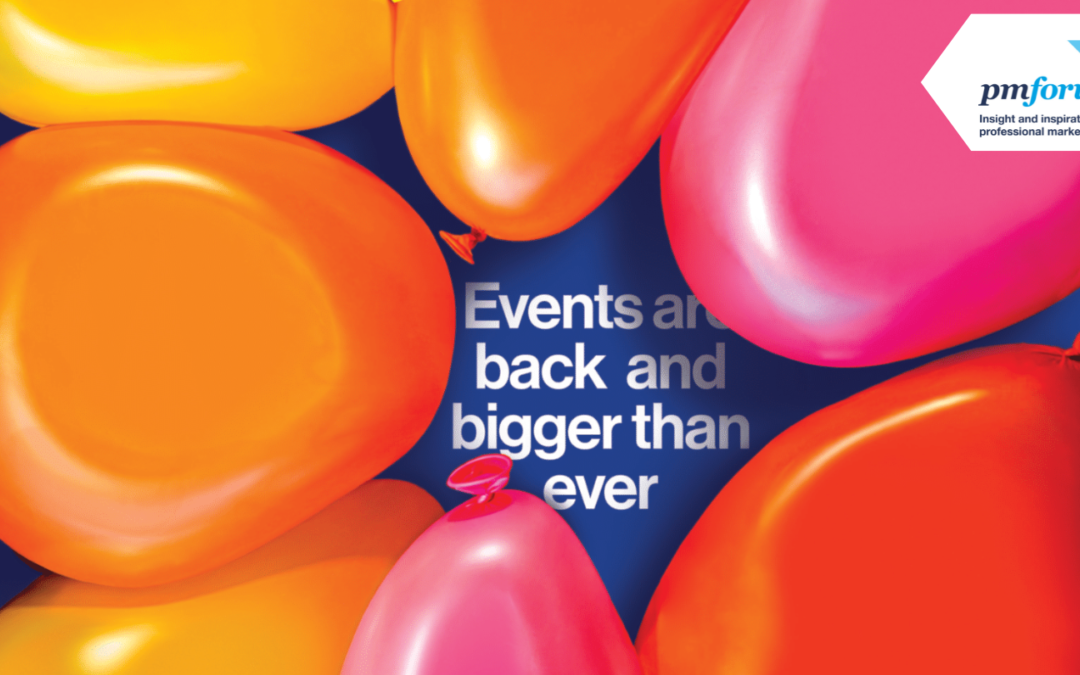The pandemic, for many people, seems like old news. Lockdowns are a distant memory, and meeting friends in the park or the pub is normal again. That odd period where all events, work or otherwise, were prohibited activities is now over.
Even so, there has been one massive hangover from the pandemic: a huge number of people working in professional services are only in the office for three days a week and we have all become used to carrying out work online. So, has the rise in home working dealt a death blow to business events? The answer is a resounding ‘no’.
“Looking at our events calendar from September through to the following July,” says Leanne Loome, Marketing Events Manager at law firm Mills & Reeve, “we’ve calculated how many events we ran in that year period. It was well over 300. In the year before Covid, it was around 160.”
While it is true that Mills & Reeve is a growing firm and is on a marketing drive, many marketing directors in the professional services space say that they are running at least as many events now as they were pre-Covid. But there are some important differences between then and now.
In-person events are still hugely important. Gatherings tend to be smaller, and timings have adapted considerably. Even so, a high proportion of events take place online, and pandemic learnings mean that both organisers and attendees are well prepared to get the best out of them. Almost everyone agrees that hybrid events simply don’t work. And finally, in person or online, time has become even more precious, so events have to be expertly targeted.
A people business
“As a professional services firm, we don’t sell Apple watches, or cans of Coke, or widgets,” says Richard Crook, marketing and BD director at tax, accounting and business advisory firm Saffery. “We sell people’s knowledge and experience, and because of that it is so important that you press the flesh with clients and targets. So I am a really big believer in events.”
Amy Mason, Head of Marketing at property consultancy Bidwells, agrees.
“In property, for example, consider our project managers. If our clients are going to entrust them to manage teams and complex projects on their behalf, there has to be a rapport, and to do that you need to meet people.”
While, initially, in-person events took a while to get up to speed, Mason says that they are increasing in popularity.
“People really do want to get back to seeing people face to face to chat, in the real world, and properly network,” she says. “Online, we tend to start talking about the topic of the meeting immediately. Face to face it is easier to have more casual conversations, and that is where you build a rapport with people. And that is so important when you are selling people, not a product.
“Networking face to face has always been a very important part of the real estate world, and that’s not going to go away.”
Paula Amos, Associate Director of Global Events at law firm Dechert, says that the firm has now made the move to predominately in-person events, but even so, virtual events are also very popular.
While 80% of events organised at the firm are face to face, “we have found that some events were better suited to the virtual format.” They are, she says, a great way to engage clients across the firm’s geographical markets.
Home and away
With the vast majority of its events in-person, Dechert, anecdotally, seems to be an outlier. Online webinars are thriving, not least because they can be accessed from anywhere and are easy to fit into the working day from home or the office. And, when recorded, they add to the firm’s precious and ever-expanding content library.
An event, however, needs to be one or the other. A mix, or hybrid events, don’t work.
“In the middle of Covid, I had thought that the post-pandemic future of events would be hybrid, with a mixture of people online and in person. But, in reality, it doesn’t work,” says Mills & Reeve’s Loome.
“A hybrid event means running two events at the same time, to two different audiences. It can be complicated and stressful for the people running it and presenting too. There is too much potential for things to go wrong.”
Even so, “hybrid means different things to different people”.
It is perfectly fine, she says, to have a speaker at an event attending via Zoom if necessary, but the audience should either be there or online. “For us they are still a huge part of what we do at M&R and the recorded content is fantastic to enable a library of content to push out to targets/clients.”
Time is precious
According to Megan Glynn, a Senior Events Executive at BDB Pitmans, the pandemic’s effects on events have been more subtle than reducing the amount of people in the office at any one time, thus reducing the number of people who can attend in-person events.
“People have made changes to their lifestyle. They have become more mindful… and aware of their work/life balance.”
Online or in-person “people will only attend the events that they are going to get the most out of”.
“They don’t want to be in huge crowds. They don’t necessarily want to go to a drinks reception on a Tuesday night… and they like to feel they have been personally invited to something.”
BDB Pitmans, she says, has been running an increasing number of smaller, much more targeted events, combining networking with thought leadership, to great success. It is a theme echoed by many marketing directors and events professionals.
One of the biggest post-pandemic downsides is that unannounced drop-outs are higher than before the pandemic. One events professional noted that an unseasonably warm midweek day almost scuppered an event as “people probably decided to work from the garden”.
An accelerated trend, aided by tech
At its most basic, events have become more targeted, more personal and, some might say, more useful. That, points out Safferys’ Richard Crook, is the direction that all marketing is taking.
“Nowadays, proving a return on investment is much more important than it’s ever been,” he says. All of marketing, events included, is simply much more professional.
This doesn’t mean that tickets to sporting events and an annual ‘thank you’ party for clients have died a death. But they are no longer as prevalent as they were 10 or 20 years ago.
“If anything, the pandemic probably accelerated existing trends,” says Bidwell’s Mason.
“We are definitely focusing on more impactful events, and clearing out those events that didn’t add value. But we were doing that before the pandemic too.”
All of this has been accelerated by technology and the explosion of AI-assisted analysis tools, such as CRM systems, that have been impacting all parts of professional services marketing.
“Things have changed for the better,” she says. “Having the ability to work out the analytics to be more targeted, and to be able to work out how an event plays a part in the whole customer journey can only be a good thing for everyone.”
James Lumley, freelance journalist, corporate writer, trainer and coach. www.byline.london
Do we need to talk about MIPIM?
Hospitality and sponsorship still pervades but it must now align with corporate values, as James Lumley discovers.
I sort of love MIPIM and hate it in equal measure,” says one marketing director, referring to the famous week-long annual property industry conference held each March in Cannes, on the Cote d’Azur.
It is known for its lavish parties as much as for the conference itself. Yachts and champagne in the playground of millionaires isn’t where most businesses like to place their brand these days.
“But the truth is, we come for two days, we host some events which are well attended, and we do a huge amount of business, because everyone is there.”
What MIPIM seems to prove is that there is still a place for seemingly old-fashioned hospitality if it gets people in the room and is ethical and inclusive. But it is also a marker for how much things have changed.
Twenty-five years ago, ‘hospitality’ was the order of the day, which, says Saffrey’s Richard Crook, often meant beer, wine and sports, and events like MIPIM didn’t raise an eyebrow.
This approach he says diplomatically, often lacked diversity, was incredibly expensive, and could not be proven to be particularly effective.
Diversity, inclusivity and sustainability
Gift registers and the financial crisis of 2008 turned the tide on lavish entertaining. But the more recent focus on diversity and inclusion is improving things further.
“Five years ago, a whole panel discussion, more often than not, might be all men,” says Bidwells’ Amy Mason.
“And in the real estate industry, a few years before it was probably all white, middle-aged men as well. I think there are real efforts to try and make the industry and its events, panel discussions and speaking slots inclusive, equal and diverse. And events have evolved to be all the better for it.”
Saffrey’s Crook agrees. “We are not going to run an event unless there is a proper gender balance,” he says. In addition, partners can only be guest speakers at events that take steps to be diverse and inclusive.
BDB Pitmans’ Megan Glynn is quite clear: any event must align with the firm’s purpose and values.
“The main thing we do in corporate hospitality is the Henley Regatta,” she says. “It is very close to our offices, we have been doing it for years, and people really like it.
“But taking people to watch Chelsea or Manchester United is probably not very inclusive. And taking people shooting wouldn’t go down well with some of the people we would like to recruit.”
And events now must be sustainable says Bidwells Mason.
The firm sponsors the Oxford and Cambridge Town & Gown 10km runs. “We have managed to make both events totally carbon neutral,” she says.
The charity the runs support, MDUK, has been trying to make the events as sustainable as possible over recent years, but Bidwells’ resources and professional expertise helped them take it further.
“It is all quite complicated, from getting rid of plastics to working out modes of transport to and from the event, but it is the right thing to do.
“You’ve got to look after your communities, and the people of Oxford and Cambridge really wouldn’t appreciate us running an event and leaving a load of plastic waste behind.”
Members only: if you want to add this reading to your CPD, please log in and complete the evaluation
Log in



